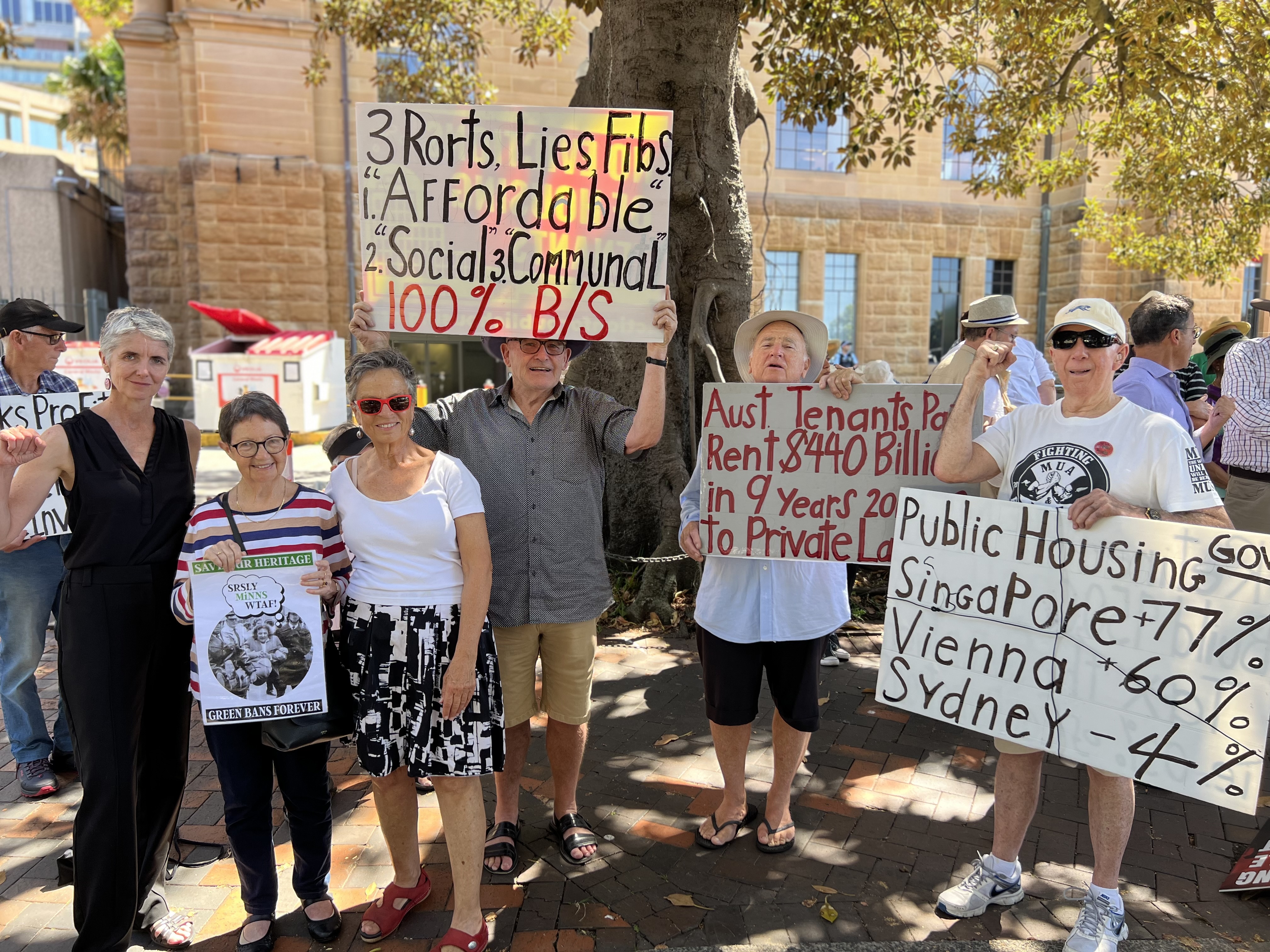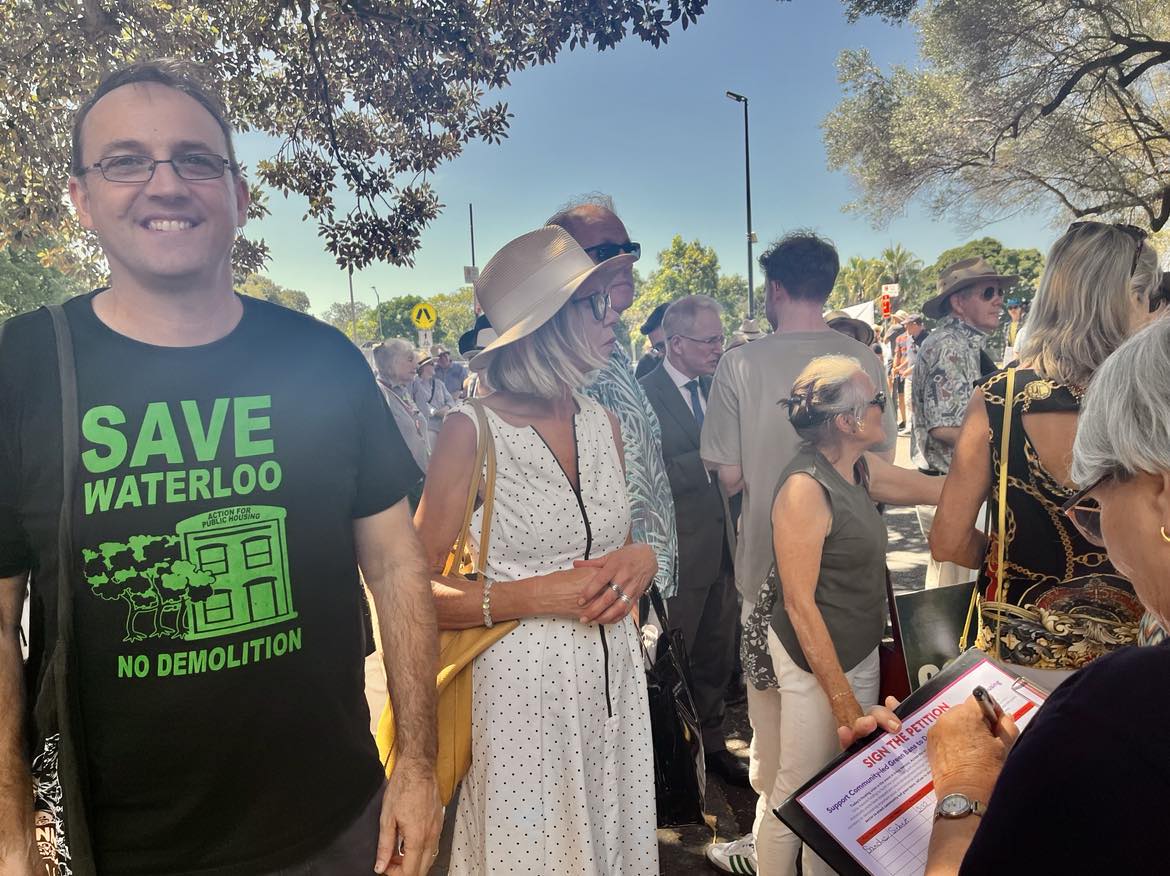
Hundreds joined a Save Greater Sydney Coalition rally outside NSW Parliament on March 12 to call for real solutions to the housing crisis, not NSW Labor’s pro-developer rezoning and development scheme.
A range of speakers, including veteran campaigner Judy Mundey and mayors from across Sydney, criticised Labor’s “one size fits all” plan.
NSW Liberal leader Mark Speakman was given a platform, but didn’t offer up an alternative. His suggestion that immigration be cut back received only luke-warm support.
Mundey’s call for more affordable and public housing was well received.
Labor’s plan involves building 185,000 new homes over 15 years along transport corridors.
Eight transport hubs have been selected for “accelerated rezoning” in the Transport Orientated Development scheme – including high rise development — and 31 fall under the new State Environment Planning Policies (SEPP) due to come into effect in two weeks
The scheme was referred to the Independent Commission Against Corruption by a Liberal MP after it was discovered that an official used and shared confidential information for personal gain.
A parliamentary committee is also now looking into the scheme, including the misuse of government information.
Committee chair Greens MLC Sue Higginson asked people to make submissions, before March 28, as the new Low to Mid Rise Housing SEPP will apply from April 1.
linda_eisler_2.jpg

Several mayors said councils were being pressured to conform and quickly, and that there has been little to no community consultation.
Most speakers emphasised they were not against low to medium density housing. They were told that there are more than 163,000 vacant dwellings across Sydney.
Zoe Baker, Mayor of North Sydney, said Labor had “adopted an easy and divisive narrative”, blaming councils for the “failures of successive state governments … to provide sufficient social housing stock.”
With the cost of housing, to rent or buy at an historic high, she said “affordable housing targets needed to be mandated”, alongside rezonings that have given private developers “windfall profits … without delivering new affordable housing”.
This is because developers “will land bank until the cost of construction finance falls and skills and materials shortages are addressed, until the development cycle is at its most profitable”, she said.
Labor needs to look into the “underlying causes of the housing crisis,” she said, “including the taxation system, the current high cost of financing for new development nor the fragile position of the construction industry post COVID-19”.
“This divisive NIMBY/YIMBY thing does not help. Pitting council against council does not help.”
Stripping councils and communities of a voice and “overriding local planning controls without mandating a percentage of affordable housing in new developments” is not the answer, Baker said. “You can have medium and high density, as well as heritage.”
Baker talked up “local place-based planning in partnership with local communities” which “delivers great outcomes”.
Her call for Labor to halt the new SEPP and “release the housing targets and give councils a timeframe to meet them,” was well received. “Trust councils and local communities to plan for additional density.”
Mundey, partner of the late Green Ban campaigner and unionist Jack Mundey, received applause for her address promoting public housing. “The provision of quality, rent-controlled public housing, built by the government could certainly go a long way to addressing the housing crisis, she said.
“The private property market — the free market — is clearly not going to achieve that outcome.”
save_greater_sydney_rally_2_ph.jpg

“This is not a new idea,” she said, pointing to government builds of public housing more than 100 years ago, and after World War II “when society faced a serious housing crisis”.
Twenty six percent of homes built after the war were public housing. The government was still building public housing in the 1970s, she said, adding, “The privatisation of public assets had not then extended to our public housing assets”.
“The loss of public stock eliminates the price control restraint that was imposed on the free market, both in terms of purchase price and rental costs by the countervailing effect of the public housing sector.
“Thus rents and house prices are now at historic highs making both ownership and rents inaccessible for many.”
Mundey said Labor is “aware of the need”, hence its proposal for higher density. But she warned that this would not “of itself ensure the availability of affordable housing”.
“If we are going to increase availability, the government needs to take responsibility for housing. We need to re-establish public sector involvement in the provision and maintenance of public housing.
“This is no more an extravagant concern than is public health care and public education. Housing is no less a basic necessity for a decent life.”